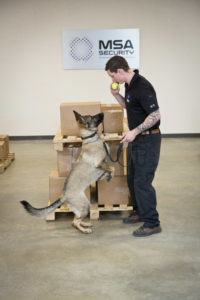A Nose for Cargo: Canine screening may become cargo security’s best friend

On a short leash
The same can be said about the trainer who trains the animal, although the details of this process are usually kept secret as “SSI” or “sensitive security information,” says MSA’s Murphy, who has been training canines for explosive detection in the cargo environment for more than five years.
Though techniques vary, training for dogs and their handlers can take anywhere between four to eight weeks, and TSA certification takes just a few days. MSA trains their teams at a 12,000-squre-foot canine training center in Memphis.
In the imprinting process, Daniels said, “you have the target odors that we want then to find, and we also include distractors – say, a donut in a box. You don’t want a dog sitting for a donut because he thinks he’s going to get a bite to eat!”
The dog and the handler have to be paired together, Daniels said. “A team – which is how they’re certified by the TSA – is a specific dog and a specific handler. They must certify together. If you change either one of those, you have to start over.”
Most dogs begin their service at about two years old and tend to be retired at around seven or eight years old, if they remain healthy, Murphy said. “In an ideal world, that handler gets married to the canine when that canine enters our training program, and when it retires, it goes home with its handler,” he said. “They’re family from the time they meet up in the training facility on to retirement and then beyond.”
As the demand for both dogs and handlers rises, Daniels said GK9PG is turning to the military as a recruiting ground. Fort Benning, in Georgia, has partnered with the U.S. Army’s Civilian Skills Program (CSP), which helps soldiers who are transitioning out of the Army and into civilian life, and often come to work as canine handlers.
“The procurement process with the dogs is critical, because you’re looking for not a specific breed but a dog that really wants to hunt and that really wants to receive a reward,” Daniels said. “For us, we are a toy-reward company. Our dogs are searching and when they find that target odor, they get their tennis ball.” Others, he says, will use food as an incentive and reward.




